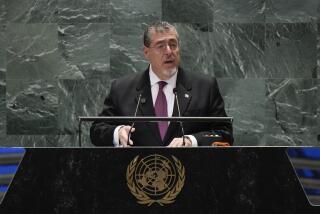Today Haiti, Tomorrow the World Body
- Share via
BRASILIA, Brazil — In one of the country’s largest foreign deployments in 40 years, a team of Brazilian soldiers is due to assume command today of a United Nations peacekeeping force in Haiti.
Ostensibly, the goal of the military aid is to help return order to the Western Hemisphere’s poorest country, which was racked by political violence and the ouster of President Jean-Bertrand Aristide this year. The Brazilian contingent, to be backed up by soldiers from other nations, will gradually take over from a U.S.-led interim force that has been operating in Haiti since February.
However, Brazil openly acknowledges a bigger mission in dispatching its soldiers to the Caribbean: raising its profile on the world stage and strengthening its bid for permanent membership in an expanded U.N. Security Council, a long-cherished hope of many officials here.
The troops began leaving for Haiti last week. All told, 1,200 Brazilian personnel are expected to be in place by month’s end, charged with patrolling the streets, disarming rebels and militant Aristide loyalists, supporting a return to democratic rule and perhaps assisting recovery efforts after the devastating floods that claimed hundreds of lives in late May.
Officially, Brazil’s participation in the U.N. force -- the South American giant’s largest commitment to a peacekeeping mission -- is scheduled to last six months. But given the challenges facing Haiti, officials here say they already expect the deployment to roll over for at least another half-year.
“Everybody knows that six months will not be enough,” said Antonio Guerreiro, a senior official in the Brazilian Foreign Ministry. “Our idea is to do the job until it’s finished.”
The decision was not without controversy. Several lawmakers accused President Luiz Inacio Lula da Silva of abetting what they called a U.S.-backed coup and occupation in Haiti. Leftists suggested that the Bush administration harbored hopes of using the tiny island nation as a military base from which to launch an attack on Cuba.
Others blanched at the operation’s $50-million price tag, an amount that opponents said Brazil -- beset by extreme poverty, spiraling crime and environmental destruction -- could ill afford.
“It’s not a national priority,” said Jose Carlos Aleluia, leader of the right-wing Liberal Front Party in the National Congress. “We have very serious problems in our country, especially in the urban areas. All of the efforts should be to pacify the civil war in Rio [de Janeiro].”
Aleluia and other critics also derided what they described as the government’s “obsession” with securing a permanent seat on the Security Council.
The desire for permanent council membership predates Lula’s presidency, however, harking back to the era of his predecessor, Fernando Henrique Cardoso. But the campaign has accelerated since Lula took office last year, becoming a component of his drive to increase developing nations’ influence on global affairs.
“Lula’s government is less subtle about its interest, and the U.N., in the midst of the Iraq controversy, has more public attention than it had before, so that it is good politics in Brazil,” said Peter Hakim, an analyst with Inter-American Dialogue, a Washington-based think tank.
“I think the [Cardoso] government didn’t want to push too hard for something it knew was very unlikely and to look like he failed,” Hakim said. “Lula is shameless on this score.”
Moreover, U.N. Secretary-General Kofi Annan has commissioned a report on internal reform that is likely to recommend an expansion of the Security Council. A Brazilian has been appointed to the panel, and officials here believe that the study, due by year-end, could offer a vehicle for pressing the case. Even then, some analysts consider the effort a longshot.
To proponents, Brazil’s inclusion in the U.N.’s top decision-making body is a no-brainer. Many Brazilians believe that their nation -- with more than 180 million people, a hefty economy, a land mass bigger than the continental United States and enviable natural resources -- belongs to the class of “monster countries” that includes the U.S. and China. Those two nations, along with Russia, Britain and France, make up the five permanent council members.
“Brazil is a natural candidate,” said Guerreiro, of the Foreign Ministry. “We have all the credentials in terms of our history, our relationships with our neighbors, the consistency of our positions, our tradition of solving peacefully our conflicts.”
He noted that the world had changed significantly since the council was formed after World War II, and he said its makeup should be “more reflective of the reality.”
Japan, Germany and India have made their own claims to permanent membership and are considered by some to stand a better chance. Guerreiro said Brazil had been in contact with those countries about the issue. It is also courting the support of its neighbors, aware that nations such as Mexico and Argentina would bristle if Brazil were cast as the region’s collective representative.
“We know that the issue of changing the composition of the Security Council is not an easy one. We know that there is resistance,” Guerreiro said. “But we think that the vast majority of the international community perceives a need for change.”
More to Read
Sign up for Essential California
The most important California stories and recommendations in your inbox every morning.
You may occasionally receive promotional content from the Los Angeles Times.














